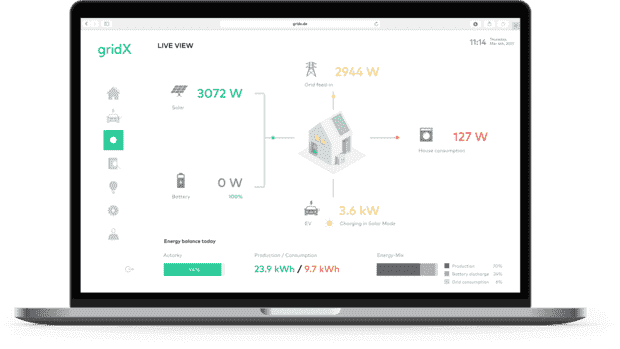The start-up develops intelligent platform solutions for controlling energy.
Dusseldorf In the power grid, with more and more electric cars, heat pumps and solar systems, things are becoming much more complicated – and, above all, more digital. That is why the Essen-based energy giant is now bringing the necessary expertise in-house and is taking over the majority of the digital start-up GridX. “Through our commitment to GridX we will be able to offer our customers innovative digital energy management solutions for the intelligent charging of e-cars, the energy management of the entire home as well as for complete smart quarters,” said Thomas Birr, Chief Strategy and Innovation Officer at Eon.
The electricity company has been working with the Munich start-up since 2017. The company, which was founded only five years ago, develops digital solutions for intelligent control in the power grid. For example, through the bidirectional charging of electric cars. They should then not only consume the electricity, but should also be able to feed it back into the grid if necessary, thus helping to better compensate for the increasing fluctuations in solar and wind energy.
The German energy world is in the midst of upheaval. Where there used to be only a few, large power plants, there are now more and more small power generation plants spread across the country. A couple of wind turbines here, a couple of solar panels there and a biogas system somewhere else.
However, wind and solar systems only produce electricity when the wind is blowing or the sun is shining, and not only when it is needed. Because there is still no way of storing green electricity on a large scale, the various systems from coal, nuclear and gas to wind, solar and bioenergy have to be started up and shut down as required in order to control consumption and generation and the grid not to overload.
Top jobs of the day
Find the best jobs now and
be notified by email.
Above all, this requires smart solutions. The German power grid is becoming an intelligent network, a so-called smart grid. Algorithms and data help to precisely coordinate power generation, consumption and storage. That is exactly what GridX does.
Based on real-time data and with the use of artificial intelligence (AI), the smart grid platform Xenon is to be used at Eon in the future. Other companies such as Viessmann, DHL and the Belgian energy group Engie also work with the software from Munich.
Germany is lagging behind when it comes to smart grids
The two founders and managing directors David Balensiefen and Andreas Booke should continue to lead GridX independently: “Our primary goal since the founding of GridX has always been to generate maximum positive impact through our technology platform,” says Balensiefen. With the majority takeover of Eon, the start-up now has access to 14 million electricity customers across Europe.
In addition to sustainability, digitization is one of the two main topics of the new Eon boss Leonhard Birnbaum. “In the future, we need to know exactly which road is likely to be overloaded. That means: We have to measure everywhere and control everywhere so that the system remains stable. And of course that is only possible digitally, it is no longer manageable ”, the CEO had already emphasized in an interview with the Handelsblatt. GridX now provides the appropriate tool for this.
However, the German network still has a lot of catching up to do in terms of digitization. A distribution network operator today can only guess what is going on behind the mechanical electricity meter. The roll-out of so-called smart meters, i.e. smart control units in households, is making slow progress in this country. In other countries such as Sweden, Finland, Spain or the Netherlands, on the other hand, the digital helpers are already hanging in millions of households. In Germany there are just a few tens of thousands.
You have to readjust again and again in order to prevent a blackout. The result: In the past year, interventions in the network caused costs of more than 1.4 billion euros. That was around 100 million euros more than in 2019. These are compensation payments for shutdowns of power plants that could not feed their electricity into the grid because of an impending overload. The solution to this problem lies not only in the slow pace of network expansion, but increasingly also in the more intelligent control of the networks.
More: Coal business worth billions: Why RWE is even making money from rising CO2 prices.

